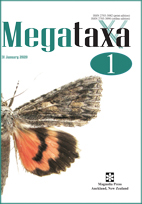Abstract
In this essay we want to shed some light on selected subjects of taxonomy that we think are worth looking at: the problems of the taxonomic workforce, the taxonomic knowledge growth based on the use of databases and web-portals and some suggestions for quality improvements in molecular databases for the benefit of the scientific community, conservation practitioners, regulators, policy-makers and citizen-scientists.
References
Dallwitz, M.J. (1980) A general system for coding taxonomic descriptions. Taxon, 29, 41–46. Available from: http://delta-intkey.com/www/dallwitz-1980.htm (Accessed 17 Jan. 2020)
Dementieva, T. (1931) On the variability of the Amphipoda of the northern seas. Akademiia Nauk SSSR, Trudy Okeanolografii Instituta, 1, 65–82.
Frobel, K. & Schlumprecht, H. (2014) Erosion der Artenkenner. BUND Naturschutz in Bayern e.V., Nürnberg, 92 pp.
Goodwin, Z.A., Harris, D.J., Filer, D., Wood, R.I. & Scotland R.W. (2015) Widespread mistaken identity in tropical plant collections. Current Biology, 25(22), R1057–R1069.
https://doi.org/10.1016/j.cub.2015.10.002
Latreille, P.A. (1823) Malacostracés. In: Desmarest, A.G. (Ed.) Dictionnaire des sciences naturelles, dans lequel on traite méthodiquement des différens êtres de la nature, considérés soit en eux-mêmes, d´après l’état actuel de nos connoissances, soit relativement à l´utilité qu´en peuvent retirer la médecine, l’agriculture, le commerce et les artes. Suivi d´une biographie des plus célèbres naturalistes. Strasbourg, Paris, Vol. 28, pp. 138–425.
Lohrmann, V., Vohland, K., Ohl, M. & Häuser, C. (2012) Taxonomische Forschung in Deutschland. Netzwerk-Forum zur Biodiversitätsforschung Deutschland (NeFo), pp. 1–122.
Migula, W. (1895) Bacteriaceae (Stäbchenbacterien) In: Engler, A. & Prantl, N. (Eds) Die Natürlichen Pflanzenfamilien. Teil I, Abteilung Ia, W. Engelmann, Leipzig, pp. 20–30.
Mora, C., Tittensor, D.P., Adl, S, Simpson, A.G.B. & Worm, B. (2011) How many species are there on earth and in the ocean? PLoS Biology, 9, 1–8.
https://doi.org/10.1371/journal.pbio.1001127
Nentwig, W., Gloor, D. & Kropf, C. (2015) Taxonomic database: Spider taxonomists catch data on web. Nature, 528, 479.
https://doi.org/10.1038/528479a
Paknia, O., Rajai Sh., H. & Koch, A. (2015) Lack of well-maintained natural history collections and taxonomists in megadiverse developing countries hampers global biodiversity exploration. Organisms Diversity & Evolution, 15, 619–629.
https://doi.org/10.1007/s13127-015-0202-1
Radulovici, A.E. & Coleman, C.O. (2017) Reconciling large molecular datasets, bioinformatics and taxonomy: prospects for Amphipoda. Biodiversity Journal, 8(2), 633–634.
Radulovici, A.E. (2019) What public data can tell us about current practices in DNA barcoding amphipods. 18th International Colloquium on Amphipoda, Dijon, France, 26-30 August 2019, Book of Abstracts, pp. 66.
Ratnasingham, S. & Hebert, P.D.N. (2007) BOLD: The Barcode of Life Data System (www.barcodinglife.org). Molecular Ecology Notes, 7, 355–364.
https://doi.org/10.1111/j.1471-8286.2007.01678.x
Ratnasingham, S. & Hebert, P.D.N. (2013) A DNA-Based Registry for All Animal Species: The Barcode Index Number (BIN) System. PLoS ONE, 8, 8, e66213.
https://doi.org/10.1371/journal.pone.0066213
Rodman, J.E. & Cody, J.H. (2003) The taxonomic impediment overcome: NSF’s Partnerships for Enhancing Expertise in Taxonomy (PEET) as a model. Systematic Biology, 52, 428–435.
https://doi.org/10.1080/10635150390197055
Sangster, G. & Luksenburg, J.A. (2015) Declining rates of species described per taxonomists: slowdown of progress or a side-effect of improved quality in taxonomy? Systematic Biology, 64, 144–151.
https://doi.org/10.1093/sysbio/syu069
Tancoigne, E. & Dubois, A. (2013) Taxonomy: no decline, but inertia. Cladistics, 29, 1–4.
https://doi.org/10.1111/cla.12019
Venera-Pontón, D.E., Driskell, A.C., De Grave, S., Felder, D.L., Scioli, J.A. & Collin, R. (2020) Documenting decapod biodiversity in the Caribbean from DNA barcodes generated during field training in taxonomy. Biodiversity Data Journal, 8, e47333.
https://doi.org/10.3897/BDJ.8.e47333
Yamasaki, H. (2015) Two new species of Dracoderes (Kinorhyncha: Dracoderidae) from the Ryukyu Islands, Japan, with a molecular phylogeny of the genus. Zootaxa, 3980 (3), 359–378.
https://doi.org/10.11646/zootaxa.3980.3.2


